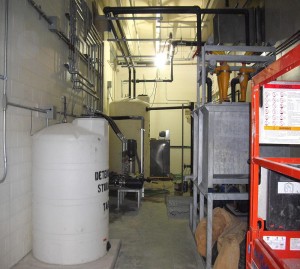Metro Gets Points For Sustainable Construction
Metro’s newest facilities show commitment to sustainability.

A bus wash reclaim room at Shepherd Parkway houses tanks that refilter water from the bus wash to be reused.
When it comes to constructing environmentally friendly facilities for employees and customers while reducing energy and lifecycle costs, Metro is taking the lead—LEED (Leadership in Energy and Environmental Design) certification, that is. As of September 2012, Metro has constructed two facilities that are LEED Silver certified— Glenmont Parking Garage and Shepherd Parkway Bus Facility – an extra effort that is well worth it.
“Sustainable facilities offer functional, comfortable and attractive environments for our employees who work there and for paying customers who use them daily,” said Edward Shepperson, Project Manager during the construction of both facilities and Contracting Officer’s Technical Representative (COTR) at WMATA. “WMATA will realize benefits through energy savings, improved employee morale and expand the public’s perception of WMATA, not only as a leader in transportation, but also as a responsible custodian of the environment.”
LEED is a U.S. Green Building Council (USGBC) program that provides third-party verification of green buildings through a rating system. Building projects earn points based on environmental impacts and human benefits of sustainable construction practices. In constructing the Shepherd Parkway Bus facility, WMATA earned points towards its LEED Silver certification for using recycled building materials, and recycling water through a large reservoir when washing buses.
“It has been a great source of personal pride and accomplishment being a member of WMATA’s project delivery team charged with the design and construction of two LEED Silver certified projects,” said Shepperson.
According to Perrilyn Fanfulik, a LEED Accredited Professional (LEED AP) and a WMATA Senior Design Architect, LEED certified buildings are also designed to allow more natural light penetration, and typically use less volatile organic compounds, improving indoor air quality. Many of WMATA’s design and engineering staff are LEED APs, equipped with the expertise to ensure that all future construction is LEED Silver certified—a Metro Board requirement.


Recent Comments